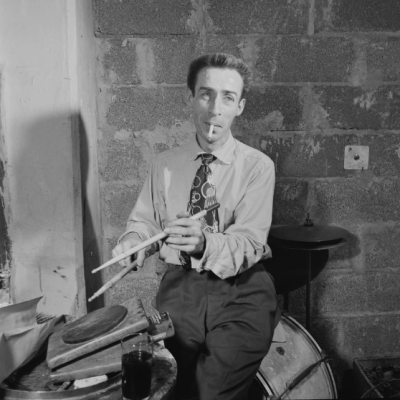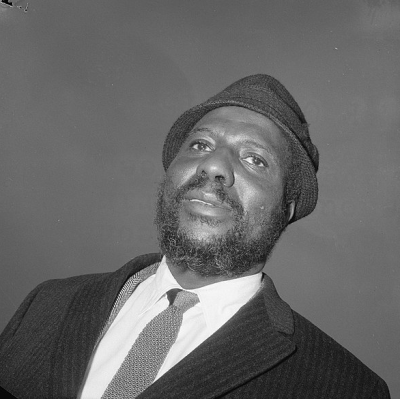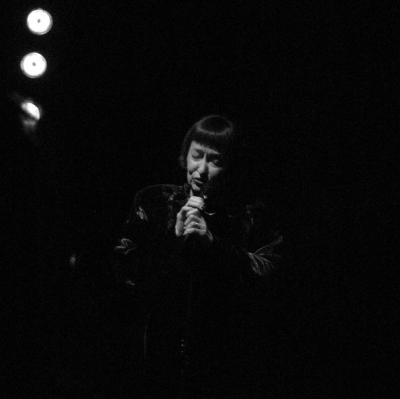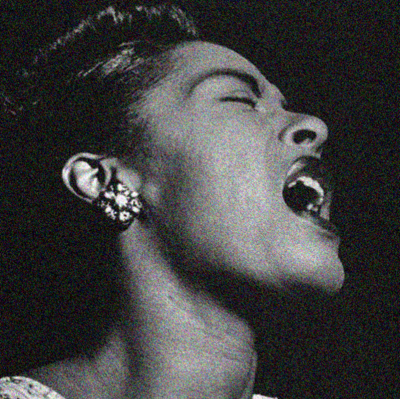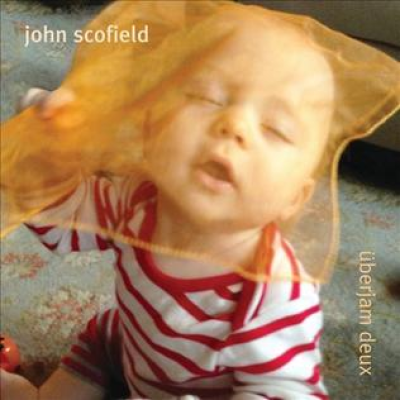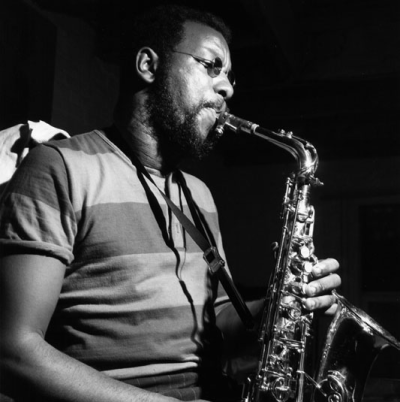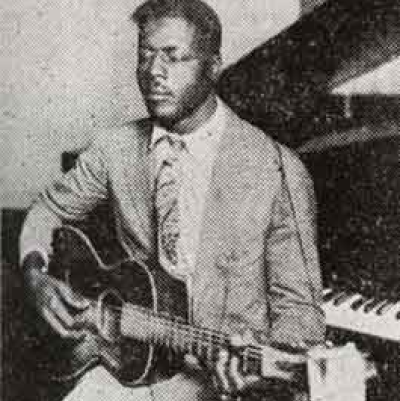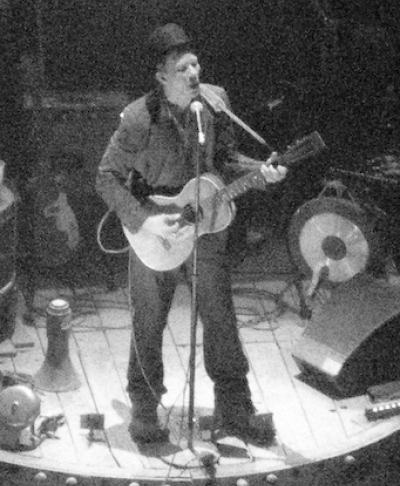.
.
“Oblivious,” a story by Carolyn Geduld, was a short-listed entry in our recently concluded 53rd Short Fiction Contest. It is published with the permission of the author
.
.
.
photo by Bill Wilson (cropped and converted to b&w)/CC BY 2.0

.
.
Oblivious
by
Carolyn Geduld
.
……..Her granddad shook Bridgett awake. He was sniffling.
…….. “What’s the matter? Are you sick?” She propped herself on her elbows.
…….. “It’s Morrison. Gone.“ He was standing there in a faded tie-dyed shirt, smelling musty. His thinning gray hair, reaching past his waist, had not been tied back, but he was wearing his love beads.
…….. Now what?
…….. “Who?” She said.
…….. “Morrison. One of the greats. Gloria. Brown-eyed Girl. Tupelo Honey.” He tried humming a few bars of something, broken up with sniffles.
…….. “What’s the fucking time? Tell me what this is about, already, so I can go back to sleep.”
…….. “Wait.” He left the room. A few seconds later, he came back with the local newspaper, probably the last of the print editions in circulation. He tossed it on the bed.
…….. “Van Morrison. Dead.” He shook his head.
…….. Bridgett grabbed the paper and looked at the headline. “Dad, it’s not Van Morrison, whoever that is. It’s Toni Morrison.”
…….. “Who’s he?”
……..She shook the paper at him. “She. He’s a ‘she.’ Toni with an ‘i.’ Not a ‘y’. The writer. Okay? Not Van. Now go away and let me sleep.”
……..He was looking at the photo accompanying the headline. “Oh. Yes. It’s a black woman. Not Van. That’s good. Fuck. I was scared there for a minute it was Van.” He shuffled out of the room looking at the paper.
…….. “And no weed,” she shouted after him. “It’s too fucking early.”
……..“Gotta calm my nerves. I thought it was Van.” He was speaking from the kitchen. As thin as the walls were, he could have still been in Bridgett’s room.
……..She was wide awake now. Out the window, the sky was a sullen gray. Somewhere, someone, a son, a lover, a friend was planning a funeral, lighting a cigarette as she was now doing, thinking of the words that must be spoken to fill the yawning absence.
……..Granddad came back into her room with two beers. He handed Bridgett one.
……..“Reminds me of Jim Morrison and The Doors. Roadhouse Blues had a great beat. He died in 1971, you know. They say it was drugs, but nobody’s sure.”
……..She was staying at her granddad’s two bedroom log cabin while she was between jobs. He was paying her a minuscule amount of money to clean up the place and cook for him. Most of the time, he was out on the porch, playing his guitar and getting high. All the guys in his old band, the Dreamers, were in nursing homes or dead. As he liked to repeat, “I’m the last one standing.”
……..“Thanks for the beer, but I’d rather have coffee when I wake up—especially when you wake me up for no damned reason. Now, can I have some privacy please?” It was no use trying to sleep.
……..When he left the room, she took a sip of the beer and placed the can along with her cigarette on the nightstand. Climbing out of bed, she ran her hand over her shaved head. It was an agreeable sensation. She wasn’t going to be a long-haired hippie like her granddad. Just the opposite. She threw on a pair of jeans and a sweatshirt. If her granddad was on a roll about old Rockers from fifty years ago, he’d want to talk to her about them, play some of his old LPs, and reminisce. That’s the other thing he paid her for. To listen.
……..It was already noon. Half the day gone. With nothing else to do, no job, no relationship, no friends nearby, she could sleep for hours. She went to the kitchen and started some coffee in an ancient metal percolator, which she had to scour out before using for the first time. Everything in the room had been coated with grease and crust when she moved in—pots and pans, dishes, appliances that dated back decades.
……..She knew about Toni Morrison from an on-line American Literature class she had taken. She hadn’t actually read any of the assigned books, looking up summaries on the internet instead. One of the lectures, about writers of color, rated Toni Morrison the top-of-the-top. But Bridgett preferred books about people like herself, white women in their thirties in romantic situations that had happy outcomes. She was a devotee of Harlequin paperbacks. Novels by African-Americans or not set in small American communities or about events she was unlikely to experience did not hold her interest.
……..At least she read. She had never seen her granddad even look at a book, let alone read it.
……..According to the newspaper, Toni Morrison had lived eighty-eight years. That was how old Grandma was when she died two years ago. Thoughts of Grandad’s fourth wife, technically her step-grandmother, made Bridgett want to cry.
……..The percolator was quiet. Bridgett filled a mug and went outside to join Granddad.
……..Without knowing these words were going to spring from her mouth, she said, “Granddad, I think we should do something to honor Toni Morrison.”
……..He strummed a few chords on his guitar. “What do you mean?”
……..“I’m not sure. Toni Morrison was an important black woman leader. We’re white. Maybe we owe it to her.”
……..“The Dreamers opened for The Temptations, once. There were black performers at Woodstock. Richie Havens was first in the lineup. Jimi Hendrix, of course. Santana was Latino. Sly and the Family Stone.”
……..“Woodstock. Let’s not go there right now.” Grandad’s time in Woodstock was a source of his repeated stories about the Dreamers. If he was stuck in the past, it was at Woodstock. “Even if rock music was sometimes an exception, I bet it wasn’t often. I wouldn’t know. But let’s face it. In every way, it hasn’t been as rough being white.”
……..“I don’t know what you’re saying,” he said.
……..“I don’t know either. I just think we should find a way to honor Toni Morrison.”
……..She sipped her coffee. He strummed harder, making an angry sound, typical of Protest Rock.
……..“Then we should honor Jim Morrison. Van Morrison was the better musician, but he’s alive. The Doors were classic. They were important leaders, too.”
……..“Granddad! The Doors were white.”
……..“So? And?”
……..“I don’t know, exactly. I have to think about it.” She went back inside. Images of Grandma came into her mind, of her making candles and wearing wool shawls. She was so kind to Bridgett when her parents died in a motorcycle accident. Granddad put her through a lot. Other women, all the money spent on drugs, always on the road with the Dreamers, never telling her if he would show up at home between gigs.
……..When she finished her coffee, she borrowed Granddad’s fifty-year-old VW Beetle. Who knew how many miles would have been on the odometer if it still worked? It may have been one of the last original Beetles on the road. It was covered with decals—peace symbols, flowers, marijuana leaves. It chugged to the library. In the rear of the building, there was a sale room where duplicate or unneeded books could be purchased. Several well-used Toni Morrison novels were there. She bought ten for five dollars.
……..Back at the cabin, Granddad was playing the guitar and singing when she got out of the car with the books in her arms. His voice was gravelly, no longer the tenor that it was in the heyday of the Dreamers.
……..“All those?” He said. When she didn’t answer, he continued his song.
……..My brown-eyed girl.
……..You, my brown-eyed girl.
……..Bridgett dumped the books on her bed. There was nowhere else to put them. The cabin did not have a shelf. The furniture was sparse. Only a bed and a nightstand were in her tiny bedroom. She kept her clothing in black plastic bags in the closet. The books lay on the chenille bedspread in a pleasing array of bright colors. The jacket of “Beloved” was red with yellow lettering. “Song of Solomon’s” was blue. “Sula’s” was green with pink lettering.
……..It reminded her of tie-dying with Grandma. The pails of fabric color. The shirts twisted and rubber-banded. The empty Ketchup squirt bottles filled with dye. The sunburst patterns. The shirts hanging on a line in the back yard where breezes billowed them like festive balloons. Together, she and Grandma made costumes for the Dreamers and clothing for themselves. Hippie clothing. Peace and love clothing with Grandma. The best memory Bridgett had.
……..That was years ago, when Bridgett was a small child, before Grandma’s hands shook with palsy. Most of the clothing was worn until ragged, then discarded, except for a few Dreamer shirts Granddad still kept. Tie-dye was old-fashioned now. Craft stores sold kits for hobbyists. But it was mostly aging Woodstock veterans who still wore shirts dyed the original way.
……..She rejoined Grandad on the porch. He was so frail that two of him could have squeezed into the Adirondack. He bent over the guitar as he strummed, resting it on his knee.
……..“How old are you, Granddad?” She sat next to him. It was dusk. Fireflies were sparking in the yard. Moths were bouncing off the porch light. The smell of weed floated around him. A blunt lay across a beer can between his feet.
……..“I was born in 1936. I guess that makes me 83. I’m the last one standing of the Dreamers. There were five of us. We were one of the substitute bands at Woodstock, in case one of the performers didn’t show. Some didn’t. They were stuck in traffic. Jim Morrison didn’t come because he didn’t like performing outdoors. Anyway, we were never called on. The organizers forgot about us. Nina Simone didn’t come because she was headlining the Black Woodstock in Central Park in the city. That was another thing that happened back then. Two Woodstocks—a white one and a black one.”
……..As he was rambling on, Bridgett was thinking that if he was 83, he might not last much longer. When he died, she would have nobody. No grandparents, parents, or siblings. No Woodstock generation to envelop her in tie-dye camaraderie. She would be alone.
……..“Want a tab?” Grandad reached into his jeans pocket.
……..“What the fuck. Why not.”
……..As she was beginning to feel the effect, she went into the bedroom and lay on top of the bed, with the Toni Morrison books rainbowed next to her. Sometimes, Grandma would lay down next to her when she was sad and cuddle her. In the haze of her altered state, which had come on fast, she imagined she was talking to Toni Morrison.
……..“I’m lost.”
……..“I’m a brown-eyed girl,” Toni Morrison said.
……..“I don’t know what to do.”
……..“A brown-eyed girl can’t help a blue-eyed girl.”
……..Maybe it was Toni Morrison. Maybe it was Grandma. Maybe it was a dream. The Dreamers. She should find them for Grandad. Have a reunion. A reunion concert at Woodstock. They should have their chance. Jim Morrison and the Doors would open. Thousands would attend. There would be love. She would be loved.
……..Quickly, she gathered up the books and went to the porch.
……..“Come on, Grandad. You don’t want to be late. Let’s go.”
……..Stiffly, he pressed down on the arms of the chair and got up. “Where to?”
……..“Woodstock. Bring your guitar.”
……..Grabbing his arm, she pulled him to the VW. He was wheezing by the time she got him seated. The guitar and the books, which would never be read, were placed in the back seat. The car key was in the ignition. She started up the road, with no map, no GPS. The little compass that hung from the rearview mirror indicated “E” for east. That was the right direction.
……..She could see the stars spinning like a roulette wheel, then slowing to point the way. If red, go left. If black, go right. In between, straight ahead. That’s all she’ll need to know. East. First to Toni Morrison’s funeral, which probably would be someplace near her home in New York. Then on to Woodstock.
……..All she had to do was follow the stars.
.
.
_____
.
.

.
Carolyn Geduld is a mental health professional in Bloomington, Indiana. Her fiction has appeared in numerous literary journals and anthologies. Her novel .Take Me Out The Back .is being published by Black Rose Publishers in 2020.
.
.
.
.
.
.







